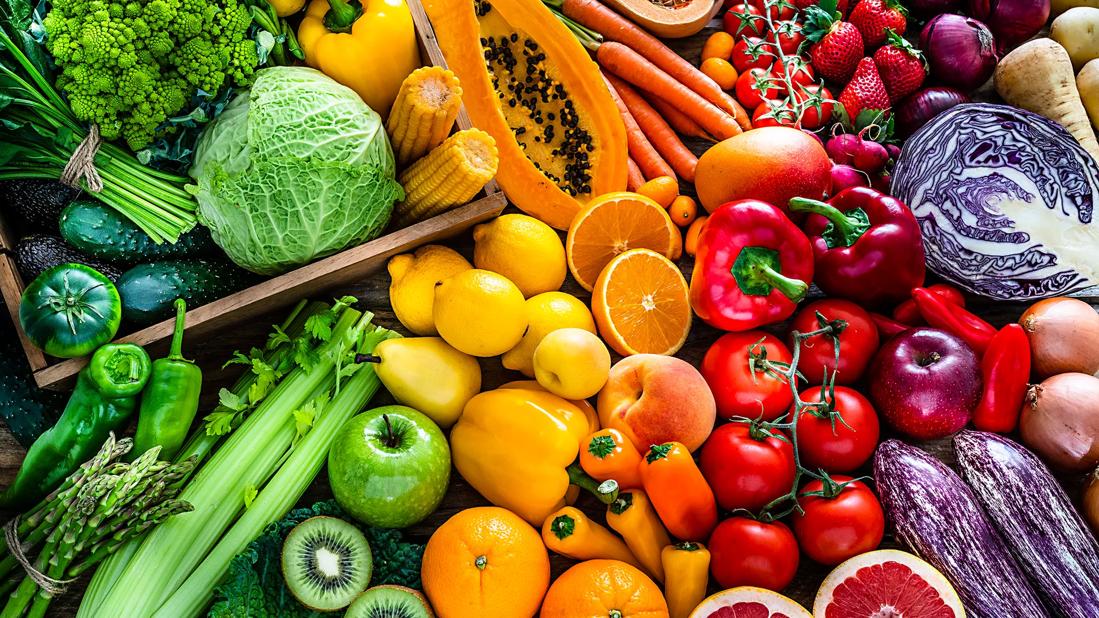Found in colorful foods like spinach, corn and oranges, this carotenoid helps with eye, skin and liver health

Image content: This image is available to view online.
View image online (https://assets.clevelandclinic.org/transform/d0778b37-c2a2-4d71-ae2d-962ff3ca6f56/rainbow-fruits-vegitables-1208790371)
Assorted fruits and vegetables in variety of colors
Carotenoids may sound like a new species of robots taking over Earth. But carotenoids are powerful antioxidants that give fruits and vegetables their vibrant hue.
Advertisement
Cleveland Clinic is a non-profit academic medical center. Advertising on our site helps support our mission. We do not endorse non-Cleveland Clinic products or services. Policy
One of these carotenoids, known as zeaxanthin, can be found in a lot of foods you eat daily and comes with a host of benefits like promoting eye health. And just like R2-D2 and C-3PO are often found roaming the cosmos together, zeaxanthin and another carotenoid known as lutein can be found side-by-side in many of the foods you eat.
“Zeaxanthin and lutein are very similar in structure with only slightly different arrangement of atoms,” explains registered dietitian Julia Zumpano, RD, LD. “They don’t work synergistically — meaning they don’t need each other to work.”
So, why is zeaxanthin so important for keeping our body’s motherboard running? Zumpano explains why you need zeaxanthin and how to work more of it into what you eat.
Thanks to its antioxidant properties, zeaxanthin can help your body in a variety of ways. Here are some zeaxanthin benefits.
Zeaxanthin is closely related to vitamin A and is naturally located in your eye’s macula and retina, along with lutein. Zeaxanthin protects your eye’s tissues by blocking damage from sunlight and by blocking free radicals that can cause oxidation.
Studies show that taking a supplement that contains lutein and zeaxanthin may be effective at improving vision in people with age-related macular degeneration (AMD) and cataracts.
Advertisement
Studies show that zeaxanthin may be able to help prevent and treat metabolic dysfunction-associated steatotic liver disease (MASLD) and steatotic (fatty) liver disease (SLD) by reducing oxidative stress and inflammation.
LDL oxidation can lead to atherosclerosis, an inflammatory disease that affects the walls of your arteries. Atherosclerosis is the leading cause of cardiovascular disease.
“Lutein and zeaxanthin are transported in HDL (‘good’ cholesterol) particles, so they specifically help the HDL particles grow,” explains Zumpano. “Bigger HDL particles help protect from the damage that LDL (‘bad’ cholesterol) can have because HDL carries cholesterol from liver tissues and then transports them out. In a nutshell, zeaxanthin and lutein help the good cholesterol and reduce the oxidation of the bad cholesterol.”
Just like how zeaxanthin and lutein protect your eyes by absorbing harmful blue light, they can do the same for your skin.
A study shows that a zeaxanthin and lutein supplement may help improve skin hydration, elasticity and inflammation.
Foods typically contain both zeaxanthin and lutein. The following foods are a good source of both:
By eating five servings of fruits and vegetables per day, you should get all the zeaxanthin (and lutein) your body needs, says Zumpano. Make sure you choose each color of the rainbow.
If you struggle to get five servings of fruits and vegetables per day, you may not be getting enough zeaxanthin. In these cases, it may be worth taking a zeaxanthin supplement.
Overall, zeaxanthin supplements are generally considered safe — though zeaxanthin may lower your blood sugar and can also cause yellowing of the skin. And there isn’t enough research to know if a zeaxanthin supplement is safe if you're pregnant or a child, or safe to take long term (past five years).
So, if you’re considering a zeaxanthin supplement, Zumpano recommends speaking with a healthcare provider before adding any kind of supplement to your diet.
And it’s important to remember that supplements aren’t regulated by the U.S. Food and Drug Administration (FDA), so you want to do your homework. Choose a product that’s been tested by a third party such as USP or NSF.
Another tip? Zeaxanthin supplements are absorbed best when taken with a high-fat meal says Zumpano.
When it comes to the health of your eyes, skin and liver, making sure you have enough zeaxanthin in your diet — whether that’s naturally through the foods you eat or by taking a supplement — is something you should consider.
Advertisement
“Zeaxanthin is found in so many foods,” encourages Zumpano. “You should definitely focus on getting zeaxanthin-rich foods in your diet on a daily basis.”
Advertisement

Sign up for our Health Essentials emails for expert guidance on nutrition, fitness, sleep, skin care and more.
Learn more about our editorial process.
Advertisement
The tropical fruit is a good source of antioxidants and vitamin C
High amounts of cholesterol and saturated fat in red meat may be linked to heart disease
The leaves and pods from this tree are rich in essential nutrients
This starchy root vegetable is a staple in many global cuisines — but it has to be prepared correctly, or it can cause serious concerns
These delicate green sprouts can give you an extra dose of vitamin K and other nutrients — but they’re not safe for everyone
Edamame, lentils and chicken breast are good sources of protein
Eating this root vegetable can help support your eye, heart and brain health
The flavorful herb is full of antioxidants that may help regulate blood sugar
Although it could be used as a moisturizer, this new trend is not recommended
Communicating clear limits helps protect your time, energy and emotional well-being
High cholesterol can be genetic, but testing and treatment can lower your heart disease risk